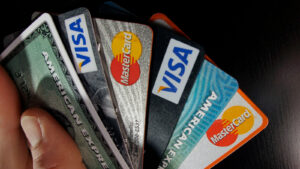How to dodge hidden fees: The ultimate guide to using credit cards abroad!
Traveling abroad is exciting until unexpected credit card fees start eating into your budget. These small, hidden costs can turn a dream trip into a financial headache if you’re not prepared.
By understanding how international credit card charges work, you can shop globally without worrying about extra expenses. This guide shows you how to make every swipe count, no matter where you are.
Understanding foreign transaction fees and how they work

Foreign transaction fees are common costs that appear when you make purchases in a different currency or country. Credit card issuers often charge between 1% and 3% per transaction, which can quickly add up during a trip. Knowing which cards impose these fees is the first step to avoiding them.
Currency conversion is another area where you might pay more than expected. Some merchants offer dynamic currency conversion, letting you pay in your home currency. While it seems convenient, this service usually comes with poor exchange rates and added fees that quietly increase your total cost.
To avoid these sneaky expenses, it’s best to stick with transactions in the local currency. Your card network, like Visa or Mastercard, typically provides fair exchange rates, making this a smarter and more affordable choice for international payments.
Beyond basic fees, it’s also important to consider potential surcharges from merchants. In some countries, local businesses add their own processing fees for credit card transactions, which can further inflate costs. Staying aware of these possibilities helps protect your travel budget.
Best credit cards for international shopping
Cards with no foreign transaction fees
Selecting a credit card designed for travel can instantly cut unnecessary costs. Many banks now offer options specifically created for international use, eliminating foreign transaction fees altogether. These cards also tend to include travel rewards and extra perks that make spending abroad more rewarding.
When choosing a travel-friendly card, focus on those from reputable issuers known for global acceptance. For example, cards from American Express, Chase, and Capital One are widely recognized and often include added protections like trip cancellation insurance or emergency support services.
Furthermore, premium travel credit cards frequently provide additional bonuses, such as airport lounge access, lost luggage reimbursement, and higher cashback rates on overseas purchases. If you travel often, the annual fee on these cards can easily pay for itself through these extras alone.
The importance of EMV chip technology
Security becomes even more critical when you’re shopping abroad. Many countries rely heavily on EMV chip-enabled cards, which provide better protection against fraud than traditional magnetic stripe cards. Before your trip, ensure your credit card features an EMV chip to avoid declined transactions.
Contactless payment features are another plus. In many regions, tapping your card is faster, safer, and more commonly accepted than inserting or swiping. Making sure your card is equipped for these technologies will help you navigate foreign checkout systems smoothly.
It’s also worth checking whether your credit card has PIN capability. Some countries require a PIN for purchases, especially at self-service kiosks, so having a card that supports this function can save you from unexpected payment problems.
Avoiding dynamic currency conversion traps
Dynamic currency conversion (DCC) is one of the most overlooked sources of extra fees. When making a purchase abroad, some merchants offer the option to charge you in your home currency instead of the local one. While this may sound convenient, it’s often a costly mistake.
DCC typically involves unfavorable exchange rates and service fees that can increase your purchase price by several percentage points. Always politely decline this option and choose to pay in the local currency instead.
How to identify and decline DCC offers
Merchants are required to ask before applying dynamic currency conversion. If you’re prompted with a payment terminal question like “Would you like to pay in USD or local currency?” always select the local currency.
If you accidentally agree to DCC, request the charge be canceled and rerun in the local currency. However, not all merchants may comply, so being alert during the payment process is crucial to keeping fees low.
Additionally, consider reviewing your receipts before leaving the store. DCC charges may be indicated on the receipt, and spotting them early can help you address the issue promptly. Staying attentive ensures you don’t pay more than necessary.
Tips to maximize savings while shopping abroad
Inform your bank before traveling
Before leaving for your destination, notify your credit card provider of your travel plans. This helps prevent declined transactions due to suspected fraud and ensures you have uninterrupted access to your funds. Many banks allow you to set travel notifications through their apps or websites within minutes.
Regularly monitor your account for suspicious activity while abroad. If you notice unauthorized charges, contact your issuer immediately. Early detection is key to resolving any issues before they affect your trip.
Consider enabling account alerts for real-time updates on purchases. These notifications allow you to spot any irregular activity instantly and take action without delay, adding an extra layer of protection to your international spending.
Leverage rewards and travel protections
Many travel credit cards offer purchase protections, extended warranties, and theft coverage for items bought overseas. Using these features can help you shop confidently, knowing you’re covered if something goes wrong.
Take advantage of cards that offer rewards points or cashback for international purchases. These benefits add extra value to your spending and can offset costs like meals, souvenirs, and transportation during your travels.
Some cards also provide emergency assistance, such as medical referrals or legal help, which can be invaluable when traveling far from home. Reviewing your card’s benefits before your trip ensures you’re prepared for any situation.
Minimize ATM withdrawal fees
While it’s tempting to use your credit card at ATMs abroad, be mindful of potential cash advance fees and high-interest rates. Instead, consider opening a checking account that reimburses ATM fees worldwide and link it to a debit card for local currency withdrawals.
If you must use a credit card to withdraw cash, try to pay off the balance immediately to minimize interest charges. But in most cases, planning ahead and carrying a small amount of local cash remains the better option.
Keep in mind that some ATMs also apply their own usage fees on top of what your bank may charge. Comparing ATM networks and looking for fee-free options can help you keep more money in your pocket during your travels.
Graduated and master's student in History. Fanatic of books and series. Editor since 2023.




